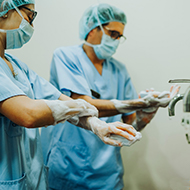
Organisations developing guidance to support veterinary professionals
The British Veterinary Association (BVA) and the Royal College of Veterinary Surgeons (RCVS) have published a joint statement for the veterinary profession addressing the new national lockdowns in England and Scotland.
It was announced yesterday (4 January) that both Scotland and England will go into national lockdowns, with people ordered to stay at home except for essential reasons until at least the end of January in Scotland and mid-February in England.
In the statement, the BVA and RCVS confirmed that they will issue updated guidance in the coming days, but will not be reverting to emergency-only work. The organisations will work to develop guidance which supports veterinary professionals in safely carrying out essential work for animal health and welfare.
As schools are now closed across the UK, the BVA and RCVS are communicating with each national government to confirm the definition of key worker status for childcare purposes and will provide updates as soon as possible.
In the meantime the organisations have directed veterinary staff to the definition of key worker (for the purposes of accessing childcare) that was previously agreed in March 2020.
The full statement from BVA and RCVS reads: “We are urgently looking at what these new national lockdowns will mean for veterinary professionals and services, and we are liaising with the Chief Veterinary Officers.
“We aim to issue updated guidance in the coming days but can confirm that we will not be reverting to emergency-only work, as we saw at the start of the first UK-wide lockdown last March.
“Instead, we are developing guidance to support veterinary professionals to carry out work that is essential for public health and animal health and welfare, in the context of the very strong ‘stay at home’ messages from both governments.
“We recognise that this continues to be a very challenging and difficult time for our colleagues, and we want to thank veterinary teams across the UK for continuing to work safely so that we can all play our part in stopping the spread of Covid.
“Once again we thank animal owners for their understanding and ask them to continue to respect their vets’ decisions at this time. The range of services available will vary between practices so that vets can work in Covid-safe ways to keep their colleagues and clients safe.”



 RCVS Knowledge has called on vet practices to audit their post-operative neutering outcomes.
RCVS Knowledge has called on vet practices to audit their post-operative neutering outcomes.